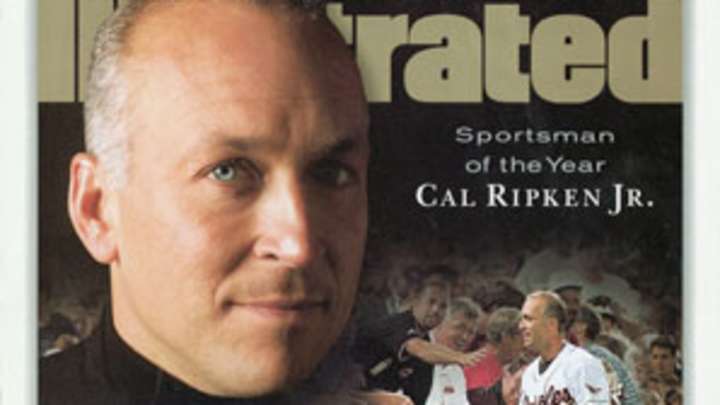Cal Ripken Jr.: In My Own Words


I was a fanatic about Sports Illustrated as a kid. That was the sports bible. You always looked forward to what was on the cover, who was in it, and especially the pictures were great.
It's a very prestigious honor, it's a very prestigious award and it's a little bit of an out-of-body experience to see yourself on the cover as the Sportsman of the Year. It's just one of those really great honors and experiences that many people find really hard to describe.
I thought it was a wonderful cover. It showcased sort of a personality of what I hoped to bring to the table. In the year of 1995, there was a lot going on. The World Series was cancelled. There was a lot of people not feeling very good about baseball. I think in my particular situation, it connected an old era feeling of baseball when it was a game to the modern era, and we did that through Lou Gehrig's streak. The picture that was picked kind of expressed that message in a subtle way.
I think the overall meaning of the Sportsman of the Year probably plays as much into your behavior, or how you look at the game and how you go about your life, as much as it is getting hits and driving in runs. You go out there to be successful and play the game right, but you honor the game, you respect your opponents. In some ways, you're an ambassador for the city and an ambassador of the game.
In our sport, I've always looked at Derek Jeter that way. There's a whole lot more to Derek than just getting big hits and doing well in the playoffs. It just seems like he understands the big picture and he uses his influence in such good positive ways.
I guess in my particular case, I was someone that just pushed along and tried to be the best I could be. But I think really, the history of the labor issues in baseball really had zapped a lot of people's love of the game. Greedy players, greedy owners, those sorts of things. I think we all wanted to have that romantic feeling with the game again. In many ways, the streak going back to Lou Gehrig, who was the most honorable man, was just that.
The cool part about the streak was that everybody related to going to work and the persistence and the consistency that related in their own lives. Whether it's an attendance record for school, that a kid didn't miss a day of school from kindergarten all the way through 12th grade, or whether it was someone that worked at the hospital that had that same sort of attitude and a sense of responsibility. You can't accomplish anything unless you're willing first to show up, and showing up sometimes is the hard part. The meaning started to unfold. But on the night of Sept. 6, there's no way in the world I would've been able to predict the reaction.
Taking a lap around the ballpark in the middle of the inning was a wonderful human moment. I didn't plan on doing it, it was the furthest thing from my mind. Rafael Palmeiro and Bobby Bonilla came up with the idea. They said the only way we're gonna get this game started again is if you do this. I was very hesitant to do it, but when I started to run around I started to change the celebration from a big applause, and 50,000 making noise, to a very intimate sort of exchange
One of the parts of the intimate exchange was catching my dad's eye up in the box. He was in my skybox; he wasn't down close to the field. There was a good distance between us, but it feels like there were a million words and a million emotions that went between him and I at the moment without saying a thing. That's my favorite memory.
